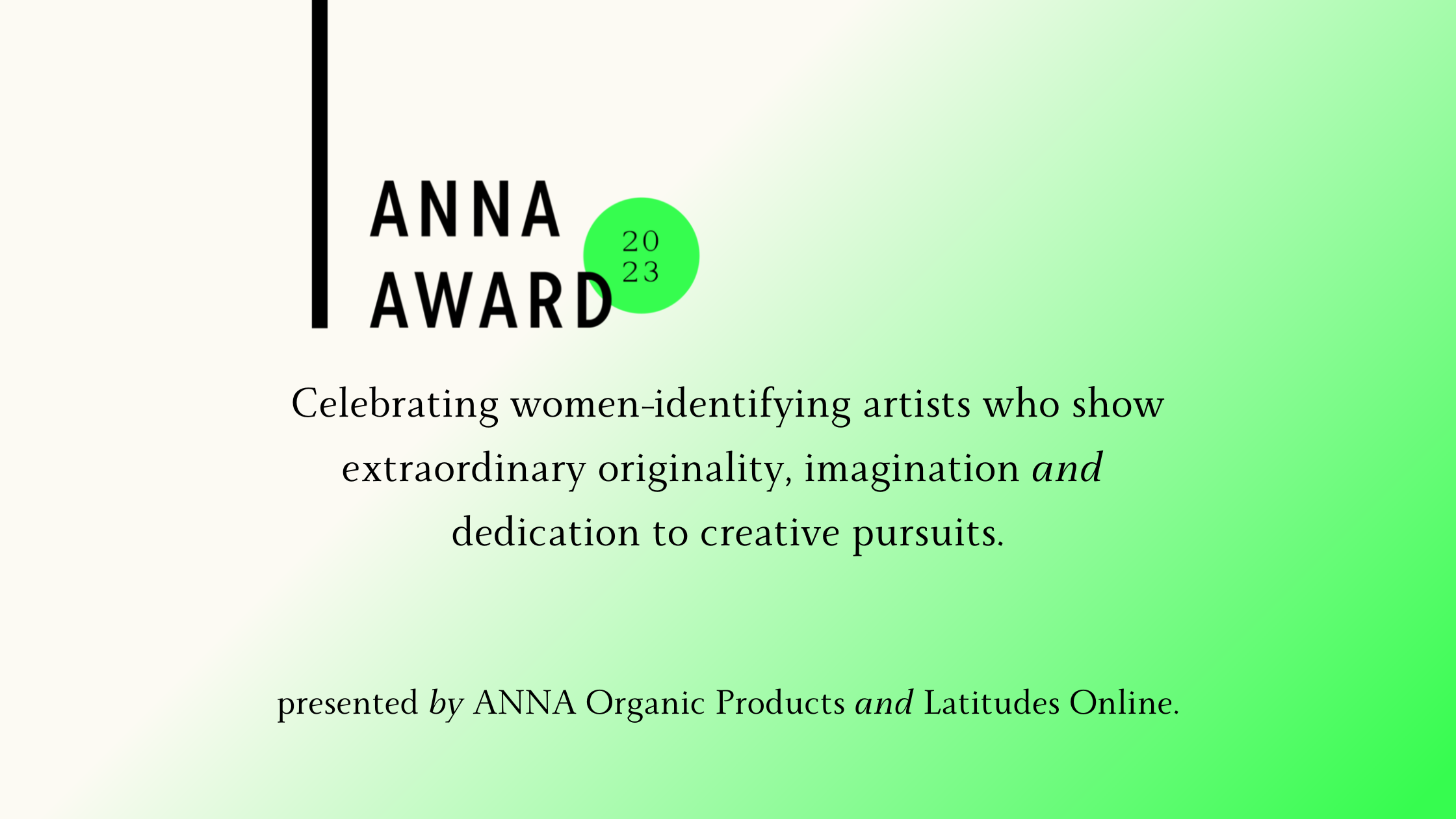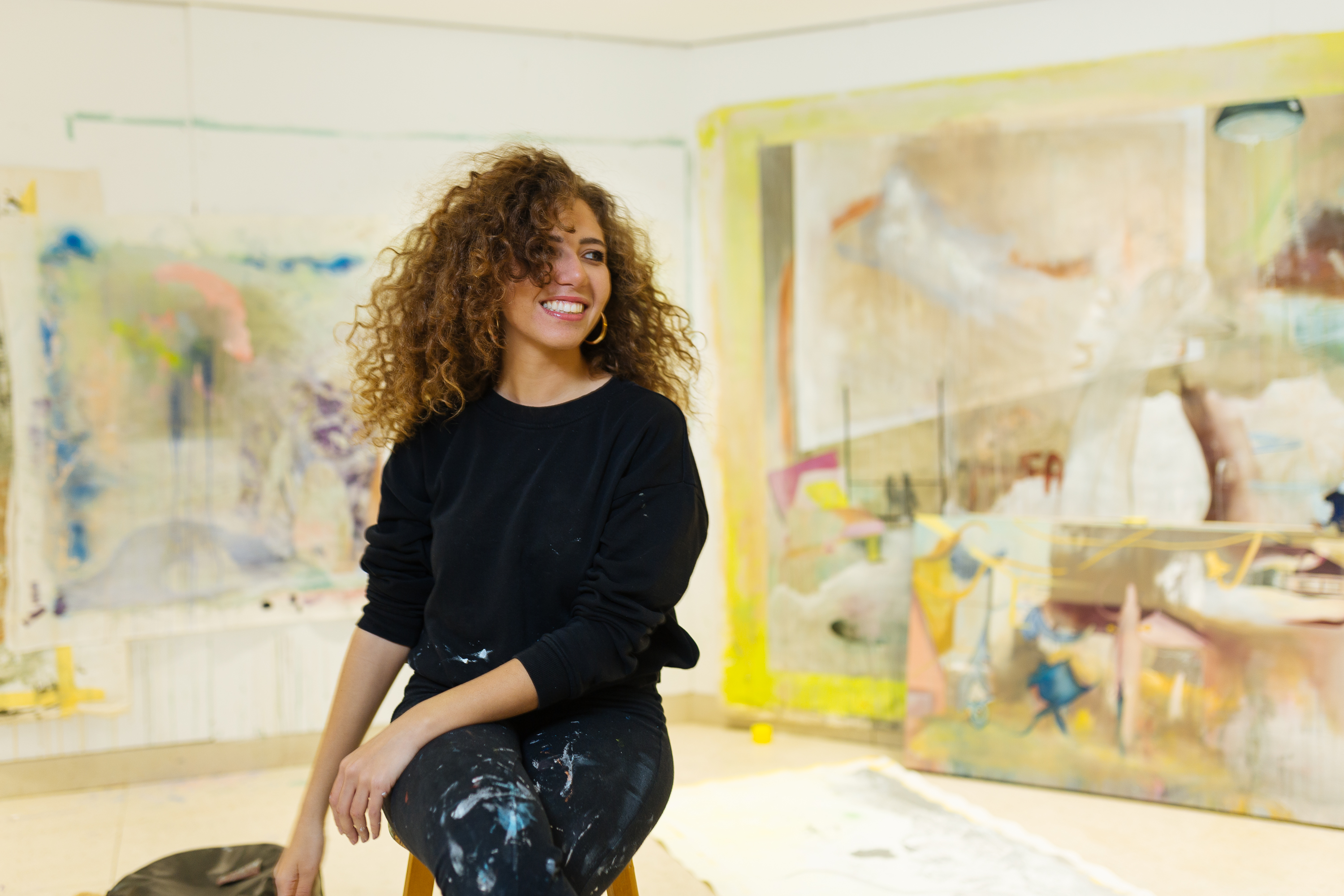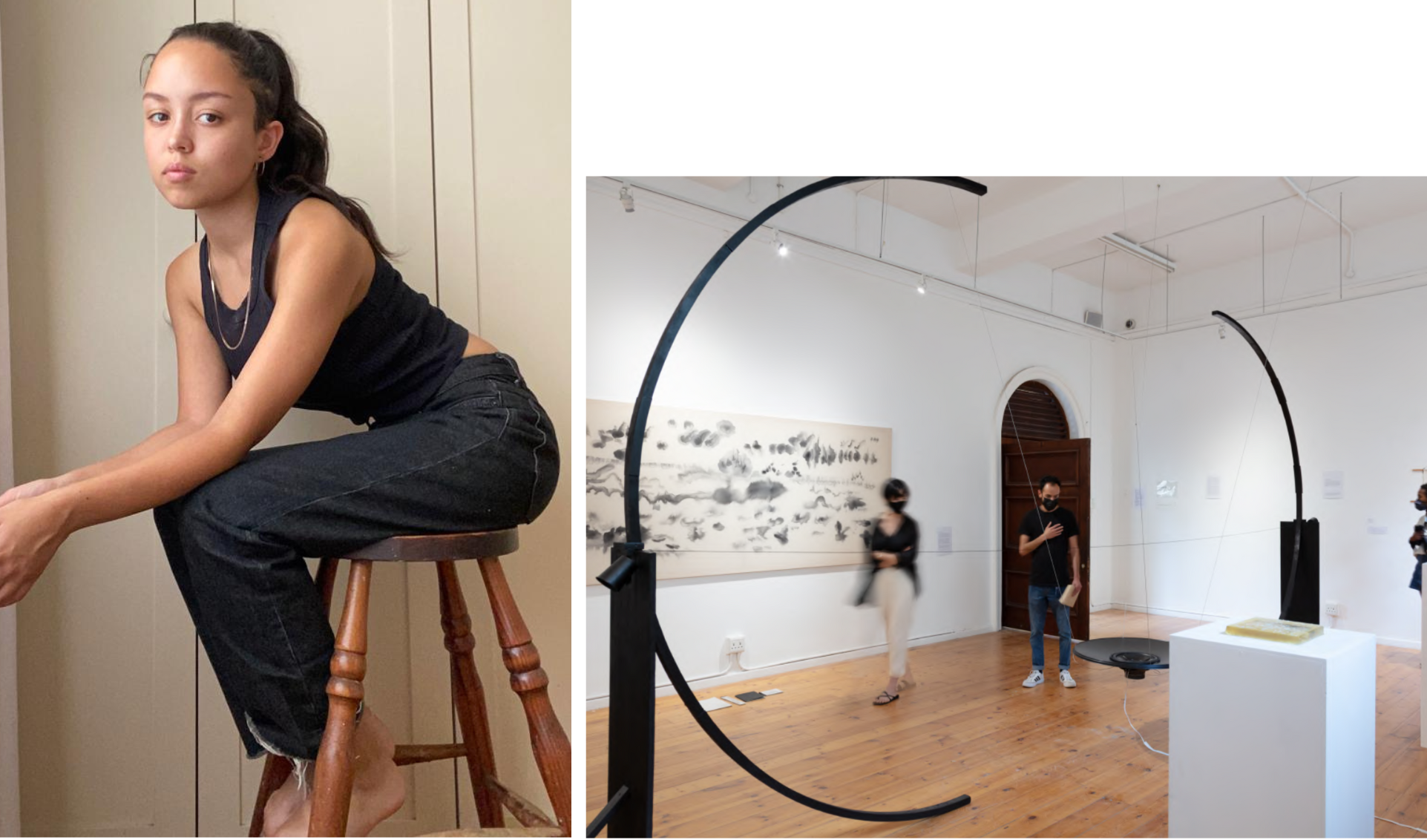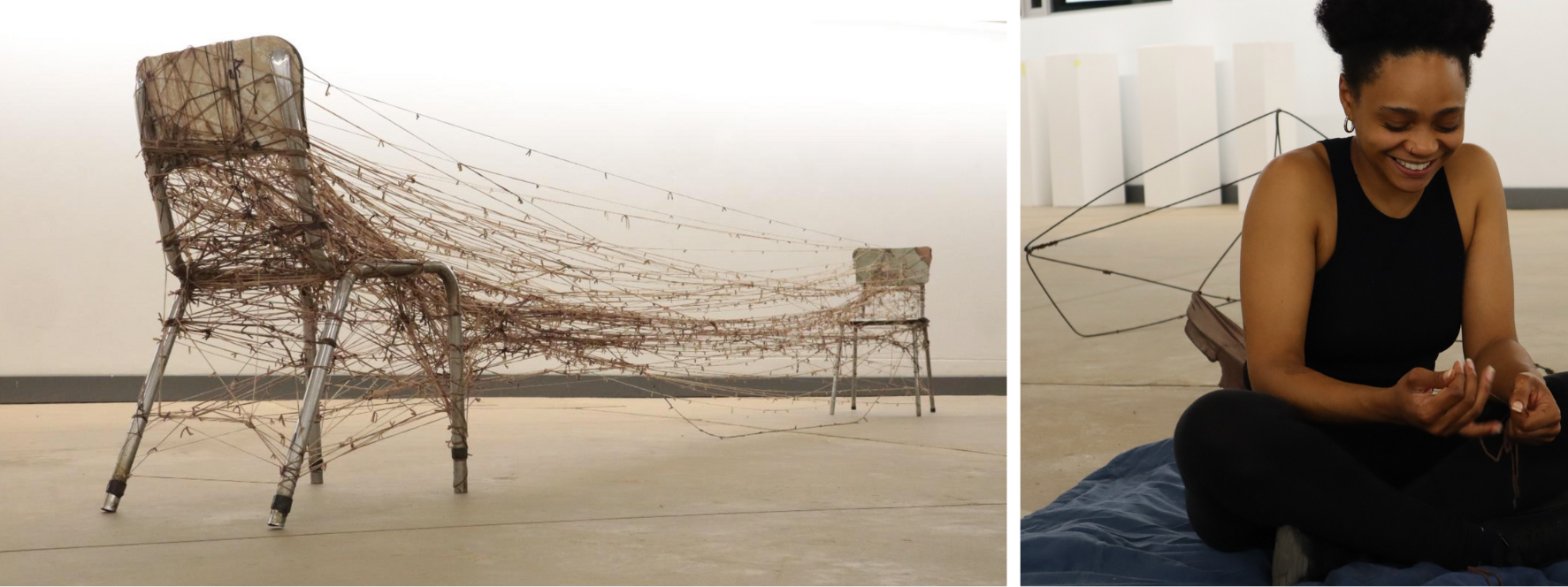
The aim of the award is to discover, recognise and nurture a new generation of women-identifying artists from the African continent and the diaspora. For both ANNA and Latitudes, it is crucial that the ANNA Award is as inclusive as possible. As such, no formal art training is required in order to apply, there are no age restrictions for applicants, and the competition is open to women-identifying artists working in any medium.
Drumroll please.... Nada Baraka wins the 2023 ANNA Award!
 Nada Baraka, portrait, image courtesy of the artist
Nada Baraka, portrait, image courtesy of the artist
Nada Baraka creates paintings that maintain an endless, active state of flux, swaying between abstract and surreal with her evocative application and vivid colours. The core of her work seeks to narrate an experience through expressionist brushwork and surrealist methodology.
"This award validated a lot of my own struggles and doubts and hard work. My mind can’t grasp that I actually won." - Nada BarakaAnd in 2nd place... Alexandra-Naledi Holtman

From left to right: Alexandra-Naledi Holtman portrait, featured artwork, courtesy of the artist
And in 3rd place... Cazlynne Peffer
Trigger Warning
 From left to right: featured artwork by Cazlynne Peffer, Portrait, courtesy of the artist
From left to right: featured artwork by Cazlynne Peffer, Portrait, courtesy of the artist
Meet the Top 12 ANNA Award Finalists!
"This year's ANNA Award Top 12 offers fresh voices that have already begun to make their mark on the continent and beyond. While the cohort offers a range of interdisciplinary practices, mediums and conceptual frameworks engaged with the arts landscape on the continent at present, there is a subtle thread that weaves through and connects them all.
The candidates all share stories of their lived experiences, placing a mirror to women's stories of love and loss, their dreams and ambitions, folklore tales and hardships of life, and notions of belonging or dispossession.
The award offers a space to reflect society back to us; to bring light to women's stories and to be able to see parts of ourselves within them. In such an endeavour, Latitudes and ANNA continue to work hard to shine a light on talent on the continent while fostering an ethos of inclusivity." - Nina Carew, Head of the ANNA Award
The Audience Award
The public was able to vote for their favourite finalist to win the Audience Award, and stood a chance to win a year's supply of ANNA Pure Organic products (for you or a community of your choice) and an Olivié Keck Latitudes Limited print.
The ANNA Award winner was announced on Women's Day, Wednesday 9 August.
Dive into the artists' practices
Alexandra-Naledi Holtman (South Africa)
Inspired by shapes and objects that both absorb and echo sound, Alexandra-Naledi Holtman's work seeks to create a space of intimate sonic transferral.
Through her art, Holtman explores a variety of media, centred on the ideas of spatial politics, memory, mapping and sound. "As my work is often motivated by spatial politics, I am currently pursuing a Master's degree in Urban Design, through which I am gaining an understanding of how space is crafted through an architectural lens."
Holtman intends to be an interdisciplinary spatial practitioner - through designing spatial installations, exploring spatial issues through visual and sonic art and collaborating with other practitioners to create outputs that can evoke collective thinking.
Holtman has a B.A in Fine Art from the Michaelis School of Fine Art and has taken part in various group exhibitions in Johannesburg and Cape Town.
Amanda Shingirai Mushate
At just 27, Mushate is establishing herself as a leading voice in contemporary Zimbabwean painting and an innovative young abstractionist with a growing international reputation. As a young woman and a new mother, in a male-dominated field, Mushate is also a role model and an advocate for women artists, making it clear that art and careers do not have to come at the cost of sacrificing family.
Like any young person, Mushate is preoccupied with finding and shaping her place and path in this world, while negotiating the complexity of interpersonal relationships. Drawing her inspiration from music and from people around her, but not wanting to be constrained by over-figuration, she paints and sculpts her happiness and burdens, and the things that she takes time to visualise. “Art is a way for me to write about a ‘future’ for me and for all individuals for them to never be overshadowed by negative influences that divert us to our true purpose in life.”
Mushate’s passionate, playful and maze-like canvases have been winning critical and international collector attention globally with works in important private collections in Cape Town, New York, Harare, London, Amsterdam and Paris.
I am a young African woman and a young mother, negotiating all the challenges of being a mother, a daughter, a wife, a provider, a carer but uncompromisingly always an artist. While life can be challenging, I want to show to young women that you succeeding in your art and in your life is not impossible. I want to be part of the change in our society, which make more space for women to be who they are on their own terms.
Azuka Muoh
Azuka Muoh’s millennial status ensures her lens on the world is sharp. This lens offers deep critique and reflection on life as a young female Nigerian in a deeply complex society that embraces artistic development while retaining an ever-present awareness of cultural and familial expectations. Muoh’s digitally rendered multiple composition portraits are surrealist and hyperbolised reflections of personal experience and indeed societal constraints– one could also say there is an influence into Afrofuturism, the Sci-Fi influenced African diaspora art and music movement that evolved in the 1990s. Patriarchal oppression, political reflection and the state of the human condition are shared departure points in these intense reflections – the results are beautifully rendered digital imagery, often in easily digestible tones but reflecting hard-hitting subject matter. Muoh’s intention lies in challenging long-held societal norms in a space where tradition has reigned for centuries.
Muoh sees herself as having a powerful mouthpiece for the marginalised and in a world where oppression is rife in so many forms, from gender-based abuse and violence to systemic patriarchal maltreatment, her portraits are a very real commentary. The fact that her work is deeply autobiographical adds significance to each piece – her relative youth is equally of interest, as there is no doubt that as time tempers her life experience, so her art will continue to intrigue and challenge the status quo. Using the language of the Instagram generation, her words “we are influencers of the thought processes of society,” feel like a sharp prediction.
Sometimes I feel like I am alone in these feelings and I want to start a conversation around them – for me, my art is a powerful way to find a common and relatable ground.
Bulumko Mbete
Bulumko Mbete, born in 1995, is a Joburg-based artist and creative practitioner with multicultural heritage. Mbete completed her BFA at the Michaelis School of Fine Art.
She undertakes research in different forms of craft and design making. These methodologies are predominantly performed by women in Southern Africa. Mbete is interested in materiality; through the use of textile, beading, natural dyeing and weaving, she creates a framework to communicate generational traditions and gestures of love.
Mbete’s interests expand into ways of engaging with the archive and using the archive for creative storytelling. In this pursuit, she uses archival matter such as photographs, textiles, and clothes. She explores the geographic connections and synchronicities within her family in relation to South African history; and its effect on migration, labour, farming and love.
My practice reflects on migration, land, textile and material culture which contributes to the archiving of our personal, family and interior histories. I aim to archive and bring forward the stories of ordinary people relating to our rich and poignant South African History and its contemporary configurations on culture.
Buqaqawuli Nobakada
Buqaqawuli Nobakada (b. 2000) is an emerging contemporary mixed-media artist born in the Western Cape and raised between Phililipi and a remote village in Lady Frere, Eastern Cape. Nobakada was first introduced to Fine Art in Johannesburg in early adolescence. Her primary medium is acrylic paint on laced paper, often with the use of custom clay or gold jewellery; wherein much of the passion in her work is expressed as she celebrates border crossings that take place in the imagination, the mind as well as in real life.
Nobakada is currently in her 3rd year of Fine Arts at the University of the Witwatersrand and is partaking in the “I Am & Nothing Else,” group exhibition with Affinity Art Gallery in Lagos, Nigeria. She has also exhibited in the “Everything was beautiful and nothing hurt” Open City group exhibition and the SOMA exhibition in France.
I think I would be great recipient for the ANNA award because throughout my practice, I’ve been actively experimenting and challenging myself to enhance my technical and conceptual abilities to do find ways to do justice to the women I present in my ways in the most honest and gentle ways as possible.
Trigger Warning
Cazlynne Peffer
Cazlynne Peffer is a multi-disciplinary artist completing her final year towards a MA(FA) at the University of Pretoria, School of the Arts, where she is currently appointed as the co-ordinator for the first year FA program.
Her body of work consists of sculptural assemblages, worn materials, found objects and video works that speak to lived experiences of trauma such as witnessing domestic violence and losing both parents to a domestic dispute (murder/suicide) at the age of eight. My most recent body of work, Muffled Violations (2022) is derived Peffer's the artist's own experience of trauma from an acquaintance rape, and is expressed through an assemblage of found objects and video works. The body of work offers a poetic account of the trauma felt from the memories of rape. "My art aims to bring alternative narratives of rape that often go undocumented to the forefront, as to position the voices of victims within a South African context of pervasive sexual and gender-based violence."
Peffer has participated in a number of group shows, namely; TEMPO (2016), Nirox Winter Sculpture Exhibition, SASOL New Signatures & Black Humour (2017), Spoke, Diewe en Digters & SASOL New Signatures (2018), Collective Memory- Documenta (2021), 7 Minute Stories- Octopus Programme, Textured Surface (2022) and RMB Latitudes (2023).
Charity Vilakazi
Born in Ethekwini, KwaZulu-Natal, Charity Vilakazi is a multidisciplinary artist and visual orator.
She make works using ibomvu (Red clay) with acrylic paints, as a way to show the beauty of her characters, this still being a form of beautification practised by African women .These works are inspired by African folktales/literature and traditional storytelling through a matriarchal gaze. "As a child, I had the privilege of being surrounded by grandmothers who believed in enforcing values that we as young girls are worth everything, and they made sure to tell us tales that had women protagonists. These tales both educated and entertained us. Storytelling was and is the backbone of keeping us united and having a sense of belonging within the realms of our ancestors."
Vilakazi's work highlights African women in folktales that illustrate the liberated and disruptive potential of female power, resilience, wisdom and agency. It also explores the wisdom of folklore, myth, fantasy, and social history, and how it can instigate social change and egalitarian relations, while celebrating the women of Africa as key protagonists, profound in their power as in their humanity. A principal theme in her work is feminism, mythology, spirituality and the influences that explore gynocentric norms in an African context.
"I think my love of sharing of stories will open up a space where other people will feel seen or heard because I create works that are very relatable very nostalgic and my aim is to bring joy and happiness in any space I try to occupy, it might sound cliché or vague but I genuinely want to bring happiness and this oral tradition of storytelling will bring back that sense of community."
Lebogang Mabusela
Lebogang Mogul Mabusela uses drawing, printmaking and paper as methods to explore what it's like navigating the world as a woman and feminine body in South Africa. She considered herself a self proclaimed Zinequeen and Monotypebabe working between Johannesburg and Pretoria. In 2019, she graduated with a BA in Fine Arts (specializing in printmaking and sculpture/installation) from the Wits School of Arts, where she was awarded the Standard Bank Fine Arts Prize. she has participated in group shows in museums and galleries across South Africa, including art fairs. In 2019 I was a Top 50 Design Indaba Emerging Creative.
Mabusela's current and ongoing body of work, Johannesburg Words, is a series of text-based portraits, comical and storyboard-like, small-scale (smaller than A4) monotype prints, that depict scenes of cat-calling, language and voyeurism as experienced in Johannesburg where she works and plays. These works were also inspired by a 1987 Robert Hodgins etching titled Jo’Burg Words. In oil pastel drawings, the text is backward, flirting with the medium of printmaking in which the artist specialises, but also to urge men who could be looking at the work to mirror themselves in the images. These text-based portraits not only call out the male gaze in the everyday but work to overturn the historical canon of women as muses and men as the artists.
"My contribution to the South African arts landscape is vital. I believe I have a tremendous promise and given the right resources like a cash prize, an international platform and a nurturing space that is willing assist artist a new generation would be able to further develop my entrepreneurial assets and mobilize and empower the arts community. The award is perfect for artists like myself who are not represented by a gallery."
Mikhailia Petersen
Mikhailia Petersen is an independent, multi-faceted creative, living and working in Cape Town, South Africa. Working through the medium of photography, Petersen is skilled in the fields of styling, creative direction and as a stills producer, cultivating a layered means of engaging with projects and work.
Often working in portraiture, Petersen aims to capture her subjects in a truthful and celebratory manner, portraying those individuals she shoots through narrative-based storytelling, as opposed to isolated and essentialising single images. Her practice lends itself towards the emotive, harnessing elements of history, culture and the lived archive of those who surround her and the individuals she works with. Deeply interested in the post-colonial landscape of Cape Town, her work seeks to re-address the way POC and LGBTQIA+ people are framed within this context through hardship and oppression. Instead, her photographs highlight the beauty and strength of people.
Petersen’s work has been published in various reputable spaces including THE FACE, NATAAL Magazine, NiCotiNe and Doek!Lit. Her work has been exhibited locally at Reservoir, THK Gallery, Ebony Gallery and AVA Gallery, and internationally at the V&A Museum X Guap x We are Soul show in London. Notable campaigns she has worked on include PUMA.
The ANNA award would be what my foremothers hoped and could only dream up for me. The prize would provide me with a resource to create more work; to tell the stories that I have been called upon to tell. In my next journey in storytelling. The prize money and acknowledgement from this award would aid this project substantially.
Nada Baraka
Nada Baraka makes paintings that maintain an endless, active state of flux, swaying between abstract and surreal with her evocative application and vivid colours. Baraka seeks to generate forms in new contexts as a means to challenge and deconstruct the obvious, and tease meaning out of absurdity.
Fluctuations of emotions triggered by various experiences build up to a narrative that eludes interpretation. The core of her work is this process that seeks to narrate an experience through expressionist brushwork and surrealist methodology. A central aspect in those narratives is the concept of eruption, appearing as distorted forms, body parts, colours or layers, all bathed in a fluidity that is punctuated with striking detail.
"As a female who believes in women empowerment and who struggles daily in a country that has one of the highest rates of harassment. It is important keep pushing and to pursue my practice loudly and proudly. To have a voice that will continue to evolve. This will happen by experimenting more frequently, trying new mediums and exploring new topics as well."
Nindya Bucktowar
Nindya Bucktowar (b. 1988 Mauritius) is a multidisciplinary artist who experiments with clay and multiple mediums to create installations inspired by natural and Durban landscapes. She specialises in ceramic topographical sculptures and installations, using earthen fragments as a medium to create immersive spaces and experiences. She considers her artistic creation as an intimate process, where she interprets and abstracts the fragments of her experiences of the physical world into her works.
"The current form of my practice is the beginning of a larger series of works interrogating the nature of spaces. As an architect, I choose to discard the mathematics and scientific nature of space-making, and instead I investigate the nature of spatial memory through fragmentation of specific landscapes, particularly in relation to my island home country."
Bucktowar's sculptural work brings together familiar and unfamiliar elements of our physical world, inspiring conversations about our relationship with the landscapes we inhabit. Her linkwork makes reference to the unconscious, the ocean, by engaging with the magic that lies in the darkest spaces.
As an artist, my vocation is to not only create authentic work, but also to constantly grow and perfect the process, the manifestation and the message. As the recipient of the ANNA Award, I am confident that the resources awarded will be wisely utilized to grow my art practice and to empower the art community.
Sethembile Msezane
Sethembile Msezane was born in 1991 in KwaZulu-Natal, South Africa and now lives and works in Cape Town. She was awarded a Masters in Fine Arts in 2017 from the Michaelis School of Fine Art, University of Cape Town, where she also completed her Bachelor of Fine Arts in 2012.
Using interdisciplinary practice that encompasses photography, painting, live works/embodiments, film, sculpture and installation. Msezane creates commanding works heavy with spiritual and political symbolism. The artist explores issues around spirituality, commemoration and African knowledge systems. She processes her dreams as a medium through a lens of the plurality of existence across space and time, asking questions about the remembrance of ancestry. Part of her work has examined the processes of mythmaking which are used to construct history, calling attention to the absence of the black female body in both the narratives and physical spaces of historical commemoration.
Msezane participated in the 14th edition of PhotoIreland, she has participated in the13th Bamako Encounters African Biennale of Photography (2022), she completed a residency at Central Saint Martins, London (2022), she participated in the 14th Dak’art Biennale (2022), she was a UEA Global Talent Fellow hosted by the Sainsbury Research Unit and Sainsbury Centre (2021). She was Mellon Artist Residency Fellow in partnership with Gallery of the University of Stellenbosch and the English Department (2020),amongst others.
My work has been dedicated to acknowledgment of women in history and mythology mostly through commemorative practice. I believe the award seeks to bridge the gap between generations of women who’ve practiced in the past and so it is in the present despite their circumstances. The award acknowledging such women makes it possible for us to continue to practice even in the future.
Further Reading In Articles
African Artist Directory





































































